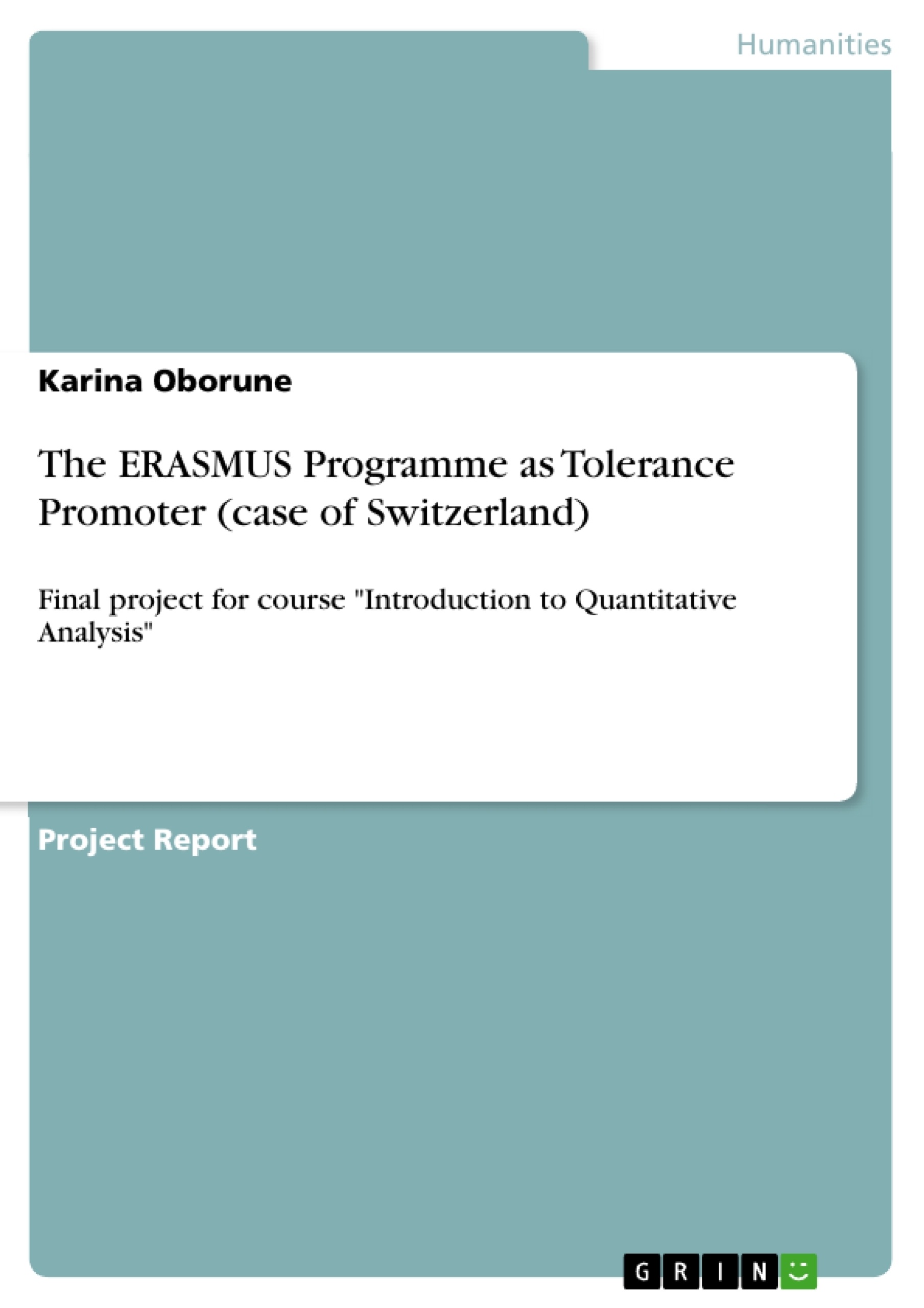This project report deals with quantitative analysis of data collected for purpose of my Master thesis “The ERASMUS Programme as Promoter of Tolerance comparing Latvia to France, Switzerland and Hungary”. There is analyzed data set, design of questionnaire and variables, hypotheses, assumptions of parametric data, Pearson correlation coefficient, homogeneity of variance, Spearman’s Rho and Kendall’s tau, causality, regression etc.
Inhaltsverzeichnis (Table of Contents)
- Introduction
- Theory
- Data set
- Design of questionnaire and variables
- Hypotheses
- Results
- I Assumptions of parametric data
- a) Normally distributed data
- b) Homogeneity of variance
- c) Interval data
- d) Independence
- II Pearson correlation coeeficient
- a) Causality
- b) R squared
- III Spearman's Rho and Kendall's tau
Zielsetzung und Themenschwerpunkte (Objectives and Key Themes)
This paper aims to analyze data collected in Switzerland to examine the impact of the ERASMUS Programme on promoting tolerance among students. It uses a survey of ETH Zurich students who participated in the ERASMUS Programme during 2006/2007, 2007/2008, and 2008/2009. The paper explores the relationship between multicultural experience and tolerance, and specifically investigates the role of the ERASMUS Programme in promoting tolerance.
- The impact of the ERASMUS Programme on promoting tolerance among students
- The relationship between multicultural experience and tolerance
- The role of social distance, inter-trust, and stereotypes in shaping tolerance
- The influence of friendship ties and trust on social distance and stereotypes
- The limitations of correlation analysis in establishing causality
Zusammenfassung der Kapitel (Chapter Summaries)
- Introduction: This chapter provides an overview of the research paper, outlining the data set used, the research objectives, and the structure of the paper.
- Theory: This chapter presents theoretical frameworks relevant to the study, focusing on concepts such as social distance, stereotypes, prejudices, and intergroup contact. Key authors like Makkonen and Allport are introduced, along with their theories regarding the interplay of these factors.
- Data set: This chapter details the data set used for the study. The data was collected from ETH Zurich students who participated in the ERASMUS Programme during 2006/2007, 2007/2008, and 2008/2009. Information about the sample size, age distribution, and gender representation is provided.
- Design of questionnaire and variables: This chapter describes the questionnaire design and the variables used in the study. The independent variables are social distance and inter-trust, while stereotypes are the dependent variable. The chapter explains the causal relationships between these variables.
- Hypotheses: This chapter states the two hypotheses that the research aims to test. The first hypothesis proposes a correlation between social distance and stereotypes, while the second hypothesizes a correlation between friendship ties and trust.
- Results I Assumptions of parametric data: This chapter discusses the assumptions of parametric data, including normality distribution, homogeneity of variance, interval data, and independence. It explains the rationale behind each assumption and how these are tested.
- Results II Pearson correlation coefficient: This chapter presents the results of the Pearson correlation analysis. The analysis investigates the correlation between social distance, inter-trust, stereotypes, and friendship ties. The chapter discusses the significance of the correlations found and provides an interpretation of the findings.
Schlüsselwörter (Keywords)
The primary keywords and focus topics of this research include the ERASMUS Programme, tolerance, multicultural experience, social distance, stereotypes, prejudices, inter-trust, friendship ties, correlation analysis, and causal relationships. This research investigates the impact of the ERASMUS Programme on promoting tolerance among students, particularly exploring the role of social distance, stereotypes, and inter-trust in shaping attitudes towards different nationalities.
Frequently Asked Questions
Does the ERASMUS Programme promote tolerance?
The study analyzes whether students participating in ERASMUS show higher levels of tolerance and reduced social distance towards other nationalities.
What is "social distance" in this study?
Social distance refers to the perceived degree of closeness or acceptance an individual feels towards members of other social or ethnic groups.
How do stereotypes affect tolerance?
The research investigates if there is a negative correlation between holding strong national stereotypes and the level of inter-group trust and tolerance.
What was the sample for the Swiss case study?
The data was collected from ETH Zurich students who participated in the ERASMUS Programme between 2006 and 2009.
What are the roles of friendship ties in ERASMUS?
The study hypothesizes that forming international friendships during the exchange significantly increases trust and reduces prejudices.
- Quote paper
- Karina Oborune (Author), 2009, The ERASMUS Programme as Tolerance Promoter (case of Switzerland), Munich, GRIN Verlag, https://www.grin.com/document/160071



